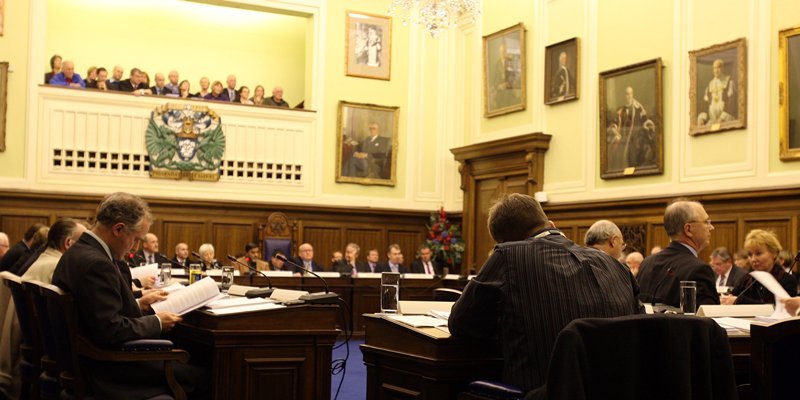Dundee City Council wants Scottish ministers to defer plans for the controversial biomass plant at the harbour until more information is available about its impact on public health and the environment.
If the government is not minded to accept the council’s recommendations or impose conditions on air quality, the council will insist on its response to the Forth Energy scheme being treated as an objection.
A public inquiry will automatically be triggered if this happens, allowing all aspects of one of the most emotive planning issues to affect the city in many years to be investigated.
In a marathon debate on Monday night lasting over three and a half hours before packed public benches the policy and resources committee heard deputations against and for the proposal before the elected members had their say.
The Dundee harbour biomass proposal is one of four being pursued by Forth Energy across Scotland and last night was the first time any of them had been formally discussed by a council.
The councils of Dundee, along with Falkirk, Grangemouth and Edinburgh, are statutory consultees in decision-making processes which rest ultimately with the Scottish Government.
The Dundee proposal was described by Forth Energy managing director Calum Wilson as a £320 million investment for Dundee and would be worth £26 million a year to the local economy. It would create between 300 and 500 jobs during the construction phase, 40 permanent jobs thereafter and 30 jobs in the port.
It has also been claimed it would pave the way to Dundee securing a future in the renewable energy industry with several hundred jobs.
It has been proposed for the land south of the Nynas refinery at King George V Wharf, and will create an opportunity to move away from electricity and heat generated from fossil fuels to a lower carbon source.
Each plant would produce enough electricity to heat 160,000 homes, but require a near 100m stack at each location, he added. It would burn a range of wood-based material, and not just wood from forests, and much of it would be shipped in.
The Scottish Environment Protection Agency (SEPA) has no objection in principle but has warned it would add to nitrogen dioxide levels already above the legal limit in that part of the city.
However the forecast increase would be so small that there would be no consequence for public health.
Scottish Natural Heritage, a statutory consultee like SEPA, said there would be effects on wildlife in the estuary, avoidable by the use of conditions, and did not consider there would be significant detrimental impact on designated sites.
NHS Tayside has raised concerns about possible health risks related to the proposed plant.
In his report to members, Mike Galloway, the director of city development, said while there were unresolved aspects with the plant it would not result in an unacceptable level of impact with controls in place.
The first deputee to speak last night was Kimberley Ellis of Friends of the Earth Tayside, who said the proposal was unacceptable and questioned whether it was really sustainable.
Continued…
Bob Adam of RATTS Residents Against Tay Turbines said the 1703 objections associated with his organisation was an under-estimate and he was concerned about the plant’s health implications.
Pleading with councillors to oppose the plans, he said, “Your time on the council is short but the legacy of your decisions will impact on the city for generations to come.”
Doug McLaren of the Tayside Foundation for Conservation and Resources queried the scientific evidence on the plant’s impact.
Bed and breakfast proprietor Linda Livingstone believed the consequences could be devastating for tourism and could undermine the benefits of the V&A coming to the city.
Councillor Kevin Keenan said he hoped the council would do nothing to weaken the tourism industry by its decision.
Michaela Sullivan of Forth Energy defended the technical case for the development and said any increase in air pollution would be negligible. Far more air pollution was caused by traffic, she added.
Asked about her objection to a public inquiry, she said it would take time and add costs to the project.
Mr Wilson pleaded for the council to back the plan, adding, “Your support would be a clear message that Dundee is open for business and is open for the renewables business.”
Administration leader Ken Guild moved that the committee gave conditional support, and if Scottish ministers are not minded to adopt the council’s recommendations, then they should treat the response as an objection, which would see the biomass plant be the subject of a public inquiry. He believed it would be the best way of ensuring health and environmental interests were addressed.
Councillor Derek Scott moved an amendment that the council object to the application as it had not been demonstrated that the plant would not have an adverse impact on air quality and visual amenity.
Mr Guild said he had not wanted the debate to appear polarised into pro and anti-air pollution and the claim that the biomass plant would be bad for the V&A project had been found to be a red herring.
His motion was carried by 14 votes to 13, then all councillors praised the deputations for their speeches.
Mr Wilson for Forth Energy said later, “We note the decision made by Dundee councillors and their request for additional information. We will continue to work with Dundee City Council and the other relevant agencies as part of the consenting process.”
